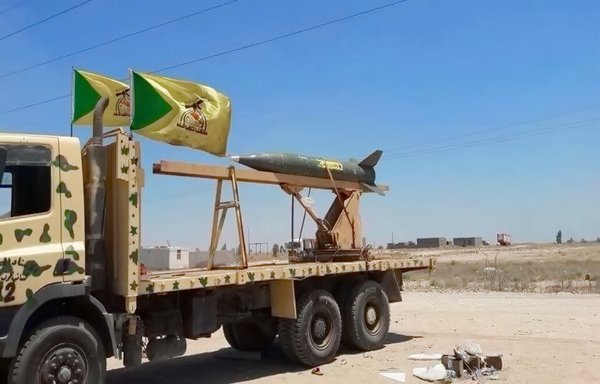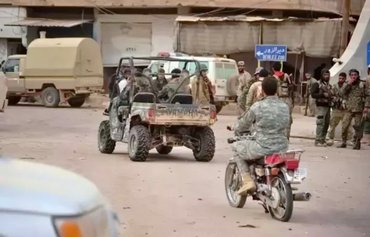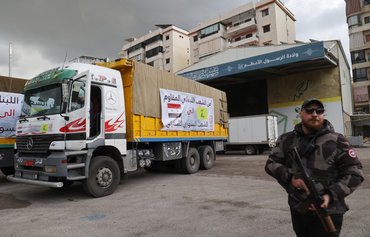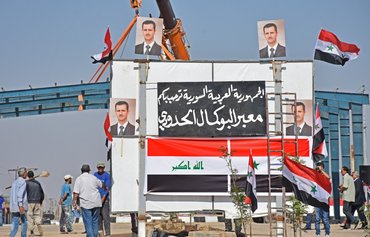A steady stream of Iranian-manufactured missiles has been arriving in Syria from Iraq via circuitous illegal crossings, making its way to the Islamic Revolutionary Guard Corps (IRGC) and its proxies, Iraqi and Syrian sources said.
"The pace of smuggling of Iranian weapons and rockets to Syria from Iraqi territory has increased in the last two months," said Mudhar al-Asaad, spokesman for the Council of Syrian Tribes and Clans.
At the beginning of March, Iran-aligned militias deployed in eastern Syria received new shipments of weapons and ammunition, in addition to tanks and troop carriers, he said.
These shipments were delivered aboard trucks, under militia escort, to the Deir Ezzor province headquarters of Sayyed al-Shuhada, an Iran-backed Iraqi militia, in the Albu Kamal area village of al-Heri, he said.

A missile is seen atop a military vehicle that belongs to the Iran-aligned Iraqi militia Kataib Hizbullah in an undated photo that was circulated online.
![Iranian militia elements are seen in Deir Ezzor on December 18. [Sada al- Sharqiyieh/Facebook]](/cnmi_di/images/2021/03/23/29072-Deir-Ezzor-militiamen-600_384.jpg)
Iranian militia elements are seen in Deir Ezzor on December 18. [Sada al- Sharqiyieh/Facebook]
The trucks crossed the border at 10-minute intervals between each of them in order to avoid detection, Eye of the Euphrates reported on March 6.
The smugglers take complex and secret routes between Iraq and Syria, driving their trucks through the valleys and desert hills in the border area to evade being targeted, al-Asaad said.
Some weapons are smuggled in civilian trucks, concealed beneath vegetables or fruit, he said, with the cargo unloaded in commercial warehouses.
Network of ISIS tunnels
Militias also transport and conceal missiles using a network of tunnels dug by the "Islamic State of Iraq and Syria" (ISIS) in Deir Ezzor.
This network extends from the village of Sheikh Anas, through al-Rahba citadel and al-Mazareh area, to the centre of al-Mayadeen.
Iran-aligned militias, notably Kataib Hizbullah, Fatemiyoun Division, Zainabiyoun Brigade, Harakat al-Nujaba and Sayyed al-Shuhada, are concentrated in towns from Albu Kamal to al-Mayadeen to the edge of al-Raqa and Aleppo provinces.
Advisors from the IRGC and Lebanese Hizbullah are also present in these areas, where the militias have warehouses in which they store the weapons, al-Asaad said.
On January 11, the Syrian Observatory for Human Rights said four large trucks carrying Iranian-made missiles crossed over from Iraq and headed to al-Mayadeen, where they were received by the Fatemiyoun Division.
On January 29, another shipment of 56 Iranian short and medium-range surface-to-surface missiles arrived from Iraq for Kataib Hizbullah, which is stationed in the vicinity of al-Tebni, in western Deir Ezzor province.
Though they are clandestine in nature, these shipments have been observed.
Over the past two months, at least six air strikes have targeted these militia strongholds, among them a January 13 strike that destroyed weapon depots and military sites in Deir Ezzor and in the desert around Albu Kamal.
Secret border crossings
There is only one official link between Iraq's Anbar province and Syria's Deir Ezzor province -- al-Qaim/Albu Kamal border crossing.
But smugglers have slipped into Syria via several rugged dirt-road crossings.
Despite concerted Iraqi efforts to protect this border area, it remains vulnerable to penetration, Iraqi political analyst Ghanem al-Abed said.
Iran-linked militias are exploiting this situation "not only to transport Iranian weapons and missiles, but also to smuggle various goods and commodities to the Syrian side, as these corridors are an economic outlet for them", he said.
"Iran is pushing to extend its influence in the border areas between Iraq and Syria by increasing the deployment of its affiliates, which now total 33 militias of various nationalities," he said.
Most of the Iran-aligned militias stationed in eastern Syria are barracked at three large bases, foremost among them Imam Ali base in Albu Kamal, he said, as well as at smaller bases.
Iran's continued supply of weapons and missiles to these groups reveals "the Tehran regime's determination to continue its regional threats and use its influence there as a pressure card against the international community", he said.

![An Iraqi militia member looks down an underground tunnel previously used by ISIS near Tal Afar, Iraq. Iran-backed militias have been using ISIS tunnels to smuggle arms into Syria from Iraq. [AHMAD AL-RUBAYE / AFP]](/cnmi_di/images/2021/03/23/29073-000_iz4hy__1_-600_384.jpg)






